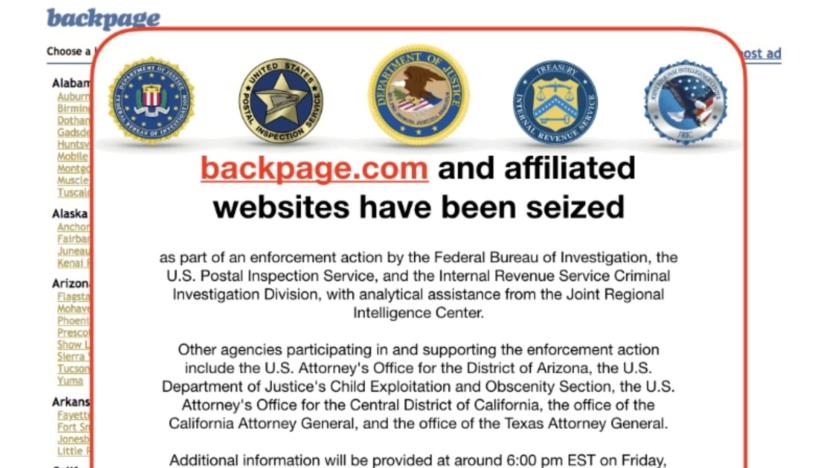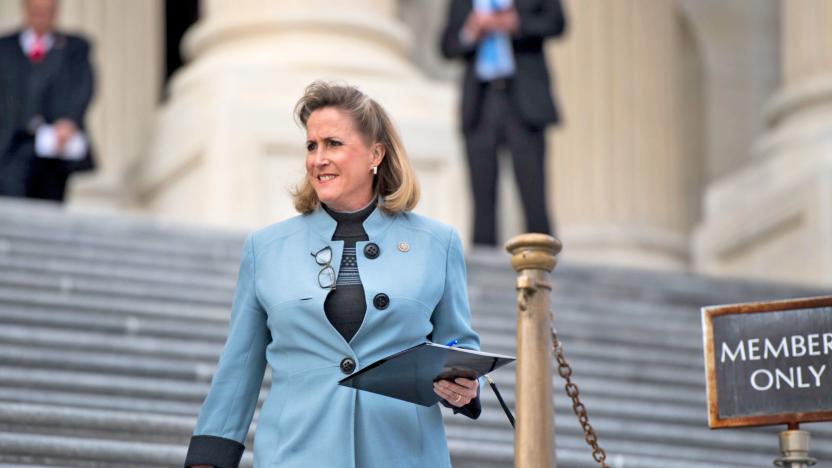fosta
Latest

Court reinstates lawsuit challenging online sex trafficking law
Civil liberty advocates are getting a second chance to challenge the legitimacy of the FOSTA-SESTA online sex trafficking law. An appeals court has reinstated a lawsuit claiming that FOSTA-SESTA violates First Amendment protections for free speech. While a judge had previously tossed the lawsuit on the grounds that plaintiffs Alex Andrews and Eric Koszyk didn't face a credible threat of prosecution, the appeals court disagreed. It determined that Andrews faced a real threat due to her sex worker support site, while FOSTA may have harmed Koszyk by denying him the ability to offer therapeutic massages anywhere on Craigslist.

Democrats want to study FOSTA-SESTA's impact on sex workers online
If you're concerned that FOSTA-SESTA seems built more to kick sex workers offline than to fight sex trafficking, you're not alone. House representatives and senators have introduced the Safe Sex Workers Study Act, a bill that would analyze the impact of FOSTA-SESTA on the health and safety of sex workers and help Congress make "informed" decisions. The politicians are concerned that banning sites from the "promotion of prostitution" only served to hurt the consensual sex industry by shutting down resources where workers could screen customers, set limits and discuss issues with their peers. This not only increased the chances for violence and health issues, but may have thwarted the very purpose of FOSTA-SESTA by pushing sex traffickers further underground.

Sex, lies, and surveillance: Something's wrong with the war on sex trafficking
Silicon Valley's biggest companies have partnered with a single organization to fight sex trafficking -- one that maintains a data collection pipeline, is partnered with Palantir, and helps law enforcement profile and track sex workers without their consent. Major websites like Facebook, Twitter, Snapchat and others are working with a nonprofit called Thorn ("digital defenders of children") and, perhaps predictably, its methods are dubious.

Why PayPal’s crackdown on ASMR creators should worry you
In June, China banned and excised videos of sound effects while claiming to cleanse its internet of pornography. YouTube had already demonetized the genre in a sex panic; now PayPal is banning people for life and holding individuals' funds, ignorant of the facts and marching lockstep to the tune of 8chan trolls enacting a campaign to punish "whores." The most bitter punchline in all this? A tiny percentage of the entire video genre is even remotely sexual, and those suffering — female creators — aren't even making sex content.

EFF and human rights groups sue to have FOSTA declared unconstitutional
The Electronic Frontier Foundation (EFF) and a number of other organizations and individuals have filed a lawsuit asking for FOSTA to be declared unconstitutional, with the EFF saying the law was "written so poorly that it actually criminalizes a substantial amount of protected speech." They're also pursuing an injunction that would prevent FOSTA from being enforced while a court considers the case. FOSTA was signed into law in April and though it claims to be an effort to stop sex trafficking, the flawed legislation features broad language, conflates sex trafficking and sex work and by many accounts, actually makes fighting sex trafficking more difficult. Among those speaking out against FOSTA and its sister bill SESTA were the ACLU, the Department of Justice, sex work rights organizations and sex trafficking victims groups.

Suicide, violence, and going underground: FOSTA’s body count
Maybe you've noticed a sudden flood of updates to Terms and Conditions recently from the internet services you use. A close look at those agreements will show that many are GDPR related, but some are most definitely not. Welcome to the culture of fear, ushered in by the passing of FOSTA-SESTA.

Backpage.com CEO pleads guilty to human trafficking
Documents unsealed today by the Justice Department (PDF) reveal Backpage.com CEO Carl Ferrer pleaded guilty to federal conspiracy charges in Arizona on April 5th, a day before the site was seized and shut down. Additionally, attorneys general in California and Texas announced today that the site itself has entered a guilty plea to charges of human trafficking in Texas, while Ferrer pleaded guilty to conspiracy and three counts of money laundering in California. Several corporate entities tied to the site, including Backpage.com LLC, also entered guilty pleas to charges of money laundering. As a part of the deal that will see him serve a maximum of five years in prison, the prosecutors say Ferrer has surrendered the URLs of the site and its data to law enforcement, and that he will cooperate in the prosecution against others involved with the company -- namely co-founders and controlling shareholders Michael Lacey and James Larkin, who were indicted April 9th. The plea deal includes Ferrer's admission that a majority of the site's ads were for sex services, and that he conspired with others to launder proceeds from the ads after credit card companies and banks wouldn't do business with the site.

FOSTA-SESTA's real aim is to silence sex workers online
The US' latest attempt to silence sex workers and people working in the adult-entertainment industry has been a huge success. Just weeks after FOSTA-SESTA was passed, the bill has begun to chill free speech across the internet. A number of websites have had to either shut down or actively distance themselves from the notion that they support sex work. And the problem is only going to get worse as time goes on.

Backpage.com was seized by the federal government
Classifieds website Backpage.com has been seized and disabled by the federal government. When you visit the website now, you'll see a message saying it and all affiliated websites have been taken over "as part of an enforcement action by the Federal Bureau of Investigation, the US Postal Inspection Service and the Internal Revenue Service Criminal Investigation Division, with analytical assistance from the Joint Regional Intelligence Center." The message goes on to name a handful of other enforcement groups involved in the action and states that more information will be provided by the US Department of Justice later this evening. Backpage is the second largest classifieds website.

Craiglist blocks personal ads to protest anti sex-trafficking law
The passing of the controversial, ham-handed Stop Enabling Sex Traffickers Act (SESTA-FOSTA) has prompted Craigslist to close its personals section. The bill is designed to punish websites with criminal sanctions if they are seen to be facilitating sex work, as a personals ad could be. Unfortunately, the legislation is drawn so poorly that any website that connects people could be targeted. Which is what has prompted Craigslist to act, with all links in the area now pointing to a short statement.

Senate passes sex-trafficking bill that may lead to online censorship
Today, the Senate passed the controversial Stop Enabling Sex Traffickers Act (SESTA) and the bill now heads to the White House where Donald Trump is expected to sign it. While some groups like the Internet Association have backed the bill, many others have come out against it saying the bill will lead to online censorship and make it more difficult to find and prosecute sex traffickers. Those who've spoken out against SESTA include the National Organization for Women, the ACLU, the EFF, the Department of Justice as well as a variety of sex work rights organizations and sex trafficking victims' groups.

How 'sex trafficking' just opened the censorship floodgates
In a 388 to 25 vote Tuesday, the House of Representatives passed legislation that makes websites criminally responsible if they can be seen as facilitating sex work. It still needs to get through the Senate, but with his daughter's endorsement, Trump is anticipated to sign it. Along with its maddening misconceptions about preventing sex trafficking and helping victims, FOSTA-SESTA incorrectly defines sex work and sex trafficking as one thing.

House passes contentious anti-online sex trafficking bill
Sex-trafficking victims, prosecutors and state attorneys will be able to sue websites that host ads and content linked to the sex trade under the bill the House has just approved. The bill called "Allow States and Victims to Fight Online Sex Trafficking Act of 2017" or FOSTA seeks to amend Section 230 of the 1996 Communications Decency Act, which protects websites from lawsuits over user-generated posts. It was filed by Rep. Ann Wagner (pictured above) to target websites like Backpage, which hosts sex and child trafficking ads. Previous investigations have revealed that Backpage went as far as editing posters' ads -- it replaced words in ads trafficking minors with terms like "fresh," for instance -- to conceal evidence from law enforcement.

Bipartisan support grows for online sex trafficking bill
The bill aimed to curb online sex trafficking has gained support from 60 senators, which means it has enough backing to withstand a filibuster once it reaches the floor. Both republican and democrat lawmakers have put their weight behind the Stop Enabling Sex Traffickers Act, with three additional members of the GOP backing it this week Bloomberg reports. Previously, the Internet Association (which counts Amazon, Facebook and Google as members) was opposed to any changes to the Communications Decency Act's Section 230, but in November the organization changed its tune after vague wording was cleared up.






